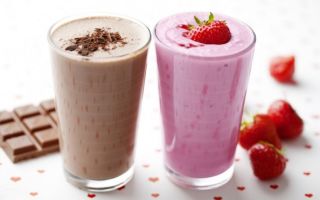Content
- 1 Why is protein useful for men and women
- 2 Protein types
- 3 How to choose protein
- 4 How to drink protein properly
- 5 How to calculate dosage
- 6 Can I drink protein at night?
- 7 What foods contain protein
- 8 Homemade Protein Shake Recipes
- 9 Protein harm and side effects
- 10 Contraindications to protein intake
- 11 Conclusion
- 12 Consumer reviews
The benefits and harms of protein, which has become popular in recent years, are primarily used as a supplement along with strength training to help improve muscle protein synthesis for muscle growth. But what it is, and what are the benefits of using this protein, not everyone knows.
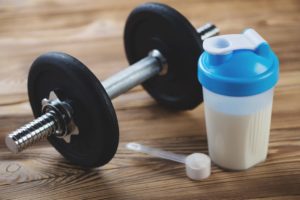
Proteins are organic protein molecules made up of amino acids (the building blocks of life). Protein helps build, maintain, and replace tissue in the body. Muscles, organs and the immune system are composed primarily of this macronutrient.
Milk is composed of two proteins - casein and whey. Whey protein can be separated from casein in milk or isolated as a by-product of cheese production. Whey protein is considered a complete protein as it contains all 9 essential amino acids. It is low in lactose.
There are many benefits to the body when consuming whey protein. Researchers are constantly finding new therapeutic properties for this substance. However, one should be aware of the possible side effects and potential dangers of such a food supplement.
Whey protein is a mixture of beta-lactoglobulin, alpha-lactalbumin, bovine albumin and immunoglobins. Potential health benefits include weight loss and lower cholesterol levels. Possible harm can be expressed in the appearance of nausea and headaches. However, in moderate doses, whey protein is not considered dangerous.
Why is protein useful for men and women
Whey protein is used for many purposes, including muscle building and weight loss. One study confirmed that eating protein while dieting helped to lose significant amounts of fat while preserving muscle mass.
The benefits of protein for the human body include lowering cholesterol levels. It has been found that the use of whey protein for 12 weeks can significantly reduce the level of total and "bad" cholesterol (LDL) in the body of both men and women.
Protein benefits have been proven in other areas as well.
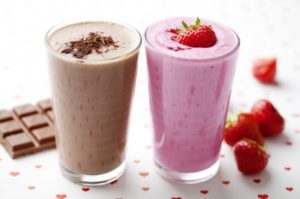
- Asthma: Whey protein improves the immune response in children with asthma. One small study in 11 children, published in the International Journal of Food Science and Nutrition, showed that 10 grams of a protein supplement twice daily for 1 month was reduced.
- Blood pressure and cardiovascular disease. Studies have also shown that beverages that were supplemented with whey protein significantly reduced blood pressure in hypertensive patients.This group also had a lower risk of developing heart disease or stroke.
- Reducing weight loss in people with HIV: The properties of whey protein have been shown to help reduce weight loss in HIV-positive patients.
Protein types
There are three main types of whey protein:
- whey protein concentrate (WPC);
- Whey Protein Isolate (WPI);
- Whey Protein Hydrolyzate (WPH).
Each of them should be considered in turn:
- Whey Protein Concentrate (WPC) is low in fat and low in carbohydrates. The percentage of protein in WPC depends on its concentration. Concentrates of a lower order have 30 percent protein, higher ones - up to 90 percent.
- Whey Protein Isolate (WPI) is further processed to remove all fat and lactose. WPI usually contains at least 90 percent protein.

- Whey Protein Hydrolyzate (WPH) is considered a “pre-digested” form of whey protein because it has already undergone partial hydrolysis, a process necessary for the body to absorb protein. WPH is much easier to absorb than the other two forms. The benefits of this type of whey are the most potent.
In addition, WPH is commonly used in medicinal protein supplements and infant formulas due to its improved absorption and reduced potential for allergen harm.
How to choose protein
"Best Protein" is an ambiguous term. The most appropriate protein supplement depends on the person's age, goals, health status, and a number of other factors.
To make the right choice, several aspects should be considered:
- what protein powders are best absorbed by the body;
- what are the benefits and harms of all the ingredients that make up the food supplement;
- which protein powders do not cause digestive upset (gas formation, bloating, etc.);
- what type of protein and its properties are best suited to the buyer's needs (gaining muscle mass, losing fat, etc.).
According to doctors, the maximum benefit and minimum harm of protein are most manifested in those species that do not contain sugar or contain little fiber.
Slimming Protein
Protein shake makers claim that their products help reduce body fat or promote weight loss, but these supplements are not magic weight loss supplements.

The benefit of protein shakes for weight loss is that replacing food with such supplements can help reduce your daily calorie intake, thus promoting weight loss. But in the end, the person will have to start eating solid food again, which will lead to the return of excess weight if the diet is not chosen correctly. If you rely too much on protein shakes as a substitute for your regular diet, you can be harmed by nutritional deficiencies.
Because protein contains calories, consuming too much can actually make weight loss difficult, especially if you drink these shakes in addition to your regular diet and don't exercise.
The benefits of protein shakes for women will be realized if the dosage is observed correctly. As a rule, the fairer sex requires smaller portions of this supplement than men.
The average adult needs 46 to 56 grams of protein a day, depending on weight and overall health. If the daily nutrition is well formulated, no additional protein supplementation is required.
Protein for gaining muscle mass
Whey protein supplements along with strength training can help improve muscle protein synthesis and promote muscle growth. This is due to their chemical properties.
One study concluded that the benefits of protein for muscle growth were indeed supported, but only at the same time as strenuous exercise. It was noted that men who consumed this supplement had greater relative gains in muscle mass.
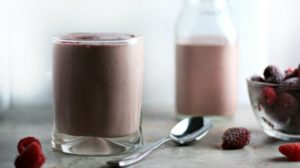
However, a much greater effect was observed with the consumption of whey isolate compared to casein protein, the properties of which are not so well expressed.
The same conclusions were reached during other tests. It has been shown that when whey isolates were consumed along with exercise, significantly greater gains in strength and muscle mass and a decrease in body fat were achieved. Thus, the benefits of protein for men have been confirmed.
Body Drying Protein
Those on a low-calorie, low-carb diet require more protein to dry their bodies.
This is because when dietary restriction occurs, the body experiences a calorie deficit and becomes more prone to burning muscle tissue for fuel. A higher protein intake helps prevent this.
Some experts state that when trying to lose fat and maintain muscle, protein intake should be around 2 - 2.8 grams per kilogram of body weight. For comparison, while maintaining general physical shape, this indicator decreases to 1.2 - 2 g.
How to drink protein properly
The benefits of protein shakes are evident in cases where a person cannot meet their minimum protein needs with food. The best time to drink them depends on your lifestyle, habits and goals.
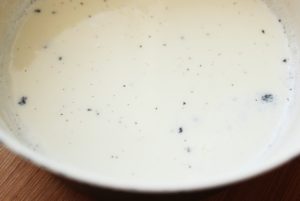
For example, someone who gets up early and commutes to work or workout will benefit from a protein shake for breakfast. It will also be beneficial as a snack between meals and exercise. In other cases, fasting protein will not be as beneficial.
For best results, you should be careful with your diet. It is recommended to eat meals and snacks that contain whole foods - fruits, vegetables, whole grain carbs, lean protein, and healthy fats. To maintain a good metabolism and energy, it is best to stick to three meals and one snack a day. In addition, you should drink at least 2 to 3 liters of water a day to help your body function to the best of its ability.
When a person adheres to a diet or does not eat for a long time, the blood glucose level is depleted and the body begins to destroy muscle reserves to obtain energy. Therefore, if you cannot eat before an intense workout, you should drink a shake with a protein supplement. This will allow you to get the most out of your training.
If the goal is to lose weight and the planned activity is not intense, additional protein before and after training is not needed. There will be little benefit from it, so it is best to have a balanced diet for the whole day, including a light snack before or after exercise.
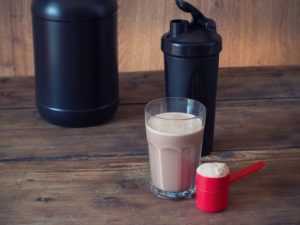
Whether you're doing intense, prolonged workouts (45 minutes or longer) or trying to gain muscle mass, proper training can help prevent muscle loss, shorten recovery time, and provide extra energy during exercise. Protein's health benefits for athletes are beyond question as they provide the body with branched-chain amino acids (BCAAs) to help maintain muscle energy stores.
Recent studies show that the total amount of protein and carbohydrates a person consumes during the day has a greater impact on the result than the exact time during which macronutrients are consumed.This means that it doesn't matter if you drink your protein shake immediately before or after your workout. Protein is beneficial for the body as it provides energy.
How to calculate dosage
Whey protein is easy to include in your diet. It is sold as a powder that can be added to smoothies, yoghurts, or simply mixed with water or milk. So, the benefit of protein for girls is that the daily addition of powder to drinks will maintain the required level of protein in the body, even on a strict diet.
Typically 25 to 50 grams of protein per day (1 to 2 scoops) is usually the recommended dosage, but the dosage instructions on the package must be followed.
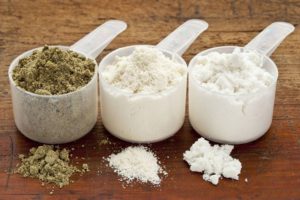
The benefits of dry protein will only be apparent if the dosage is followed. It depends on your lifestyle and your goal. The protein intake rates are as follows:
- For athletes or very active people trying to lose body fat and increase muscle mass (drying the body), a daily intake of 1.5 - 2.2 grams per kilogram of body weight is optimal.
- For those who lead a very active lifestyle, play sports or are trying to lose weight without losing muscle tissue, the recommended dose is 1.0 - 1.5 g / kg of body weight.
- For those leading a sedentary lifestyle and those who want to slightly reduce weight, 0.8 grams / kg of body weight every day will be optimal.
If your daily protein target is achieved through your diet, no protein powder supplementation is required. Obese individuals should not follow the above recommendations, as body weight calculations will lead to very high dosages. This can ultimately cause harm.
Can I drink protein at night?
Drinking a protein shake at night can disrupt sleep and be harmful, depending on the type of protein. The energy boost from the simple sugars in the liquid protein supplement may not be beneficial. Moreover, it can lead to increased weight and fat stores. In this case, the properties of these protein drinks may not be beneficial.
What foods contain protein
Since protein shakes can be beneficial as well as harmful, you can replace them with regular protein-rich foods. These include:
Oats and spinach
This healthy combination of foods works great in smoothies because they're not only high in protein, but also high in magnesium and potassium. The properties also include a low fat content.
Oats have 7 grams of protein per half cup and spinach has 5 grams per cup. This means that a healthy shake of 2 cups of spinach and 1⁄2 cup of oats will give your body 17 grams of protein!
Spinach also alkalizes the body to prevent inflammation, and the magnesium in both foods supports muscle and bone health and energy. Both products have a mild flavor and will add a delicate, slightly nutty flavor to your smoothie.

Hemp seeds and cabbage
Hemp seeds are a renowned source of protein (13 grams per 3 tablespoons). They are rich in iron and magnesium, like kale, which contains 5 grams of protein per cup.
For a cocktail with health benefits, mix 3 tablespoons of hemp seeds and one cup of kale to get 18 grams of protein. Another benefit is that healthy fats from hemp will help the body absorb nutrients much better, such as vitamins A, E, and K (fat soluble).
Pumpkin seeds and oats
Pumpkin seeds are among the most alkaline seeds, as shown by their dark green color, which indicates a high chlorophyll content. They contain 5 grams of protein per 1/4 cup, which is more than any grains or greens per serving (except spirulina). Although they are high in fat, these fats have beneficial properties in protecting the heart and brain. Oats pair well with pumpkin seeds for taste, and both are rich in magnesium and potassium, as well as iron and zinc. For a healthy smoothie, it is recommended that you mix 1/4 cup pumpkin seeds and half a cup of oats for 13 grams of protein.
Quinoa and spinach
To benefit your body, you can use quinoa flakes or even whole grains in smoothies. It imparts a mild, nutty flavor that is easily masked by a small amount of green apple and blackberries or blueberries. Quinoa is also an excellent source of iron, magnesium, and potassium, which perfectly complement the nutrients in spinach.
For maximum benefits, use half a cup of raw quinoa (soaked) to get 12 grams of protein. And if you mix it with 2 cups of spinach, the body will immediately receive as much as 22 grams of this macronutrient.
Almond oil and chia seeds
These two healthy, fatty foods are a great way to boost your energy levels. The properties allow them to be included in a low-carb diet plan. Both products are excellent sources of magnesium, along with protein and potassium. For the healthiest option, it's best to go for raw, salt-free almond oil that contains no additives. Two tablespoons of this oil provides 7 to 8 grams of protein and 2 tablespoons of chia seeds gives 5 grams. This will provide a very healthy protein drink with 12 grams of this macronutrient.
Chia seeds and cabbage
Chia seeds and cabbage are recommended for iron production. Both are amazing energy sources thanks to their content of B vitamins, magnesium, iron, protein and potassium. If you mix two cups of kale and 1/4 cup of chia seeds in a shake, the mixture contains 20 grams of protein.
Since these foods are rich in fiber, they will also provide great benefits for lowering blood sugar levels. Their healthy properties are unique.
Homemade Protein Shake Recipes
Whey protein properties help you successfully lose weight and maintain muscle. However, one should carefully consider contraindications, otherwise the continuation of use will threaten the body. In this case, it is better to focus on choosing foods that contain natural proteins and start making cocktails yourself. Each of them has unique beneficial properties.
Green smoothie
Place pieces of mango, banana, berries and spinach in portioned glasses and grind with a blender. Freeze each serving in freezer containers or sachets if desired. This way, the finished ingredients with the beneficial properties are ready to cook.
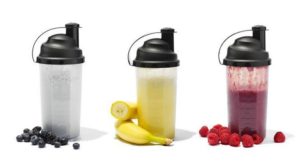
Thick banana smoothie
Sesame seeds are rich in protein, vitamins and minerals. For a more intense nutty flavor, it is recommended to roast them before adding them to the cocktail. All you need to do is heat the skillet to medium heat and add the seeds. After that, they are ground in a blender with banana pulp.
Apple Peanut Smoothie
Peanut butter is one of the best protein sources to eat because it contains heart-healthy fats that fill you up and taste good. However, you should always check the ingredient list before buying a can to avoid the sweetened hydrogenated oil versions. To make a smoothie, mix the butter with apple pulp and high-fiber oatmeal.
Protein harm and side effects
The benefits of protein shakes are widely spoken about, and the harm from them is rarely mentioned. The most common negative property of protein is its ability to cause abdominal pain and cramps when consumed in high doses.
Some people who are allergic to milk may get a certain reaction to whey. Whey protein does not cause side effects in moderate doses. However, consumption in large quantities can harm the body:
- stomach ache;
- colic;
- decreased appetite;
- nausea;
- headache;
- fatigue.
Consuming high doses of whey protein on a regular basis can also cause acne. Nutritionally speaking, whey protein has very unusual properties and does not have a natural equivalent.
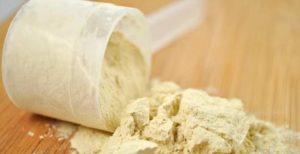
Some people believe that such refined foods are harmful because, although they are high in nutrients, their chemical balance tends to a large extent toward protein.
Contraindications to protein intake
As noted above, the beneficial properties of protein appear only when consumed in moderate doses. Excessive addiction to this supplement can cause harm, including causing digestive problems such as nausea, pain, bloating, cramping, flatulence, and diarrhea.
However, moderate consumption of whey protein supplements is well tolerated by most people.
The only contraindication may be lactose intolerance. In such a case, a whey protein hydrolyzate or isolate may be more suitable than a concentrate. In addition, if you have liver or kidney problems, you should consult your doctor before taking protein supplements.
Conclusion
If you remember how the benefits and harms of protein are expressed, you can successfully use it to gain muscle mass and get rid of excess weight. The main thing is to correctly calculate the dosage and observe moderation.

